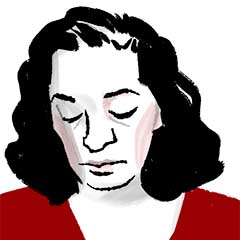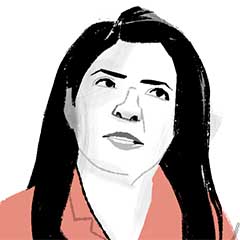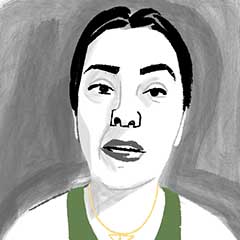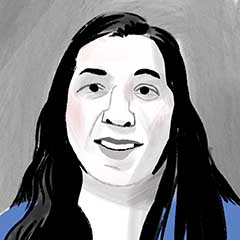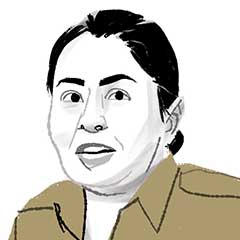Part 1
Family Trauma
Decades of human rights violations in Iran have affected generations of families.
By Elizabeth Walsh and Brian Williamson | VOA News

Nilu Jenks doesn’t recall having a strong reaction when Amini’s death was announced to the world.
“That is so normal for the Iranian experience. … She’s one of thousands.”
Nilu Jenks
a 45-year-old Iranian American
What did capture her attention was the reaction from so many Iranians.
For years, Jenks and her mother have debated who or what could bring change to Iran.
“There’s never any knowing what sparks a revolution. It’s just, enough loss. ... Enough torture. Enough abuse.”
Jenks’ parents moved to the United States before the Iranian Revolution in 1979 and had every intention of returning to Iran.
But in February of that year, the shah was toppled, and the Islamic Republic was born — just one month after Jenks.
“I was supposed to grow up in Iran.”
The revolution divided her family. Many Iranians who remained in the country experienced oppression and often faced imprisonment and torture.
Some of those who moved to the United States experienced discrimination.
Like others in Iran, Jenks' family has borne decades' worth of loss, torture and abuse.
Their experiences offer a glimpse into why Amini’s death was finally enough for so many.
“Gita," Jenks' aunt, was 19 when the Komiteh stopped her on the street.
It was 1980, and she was caught in a sting operation after the government sent a message from someone they'd already arrested.
“My aunt was in the Mojahedin at the time.”
The People's Mojahedin Organization of Iran (MEK) is an Iranian resistance group founded in 1965 by leftist Iranian students.
Initially, its ideology was based on Marxism, feminism and Islamism.
But the group later became a source of controversy after it carried out several terrorist attacks.
Some Iranians continue to view MEK as a terrorist group.
Others call it a peaceful movement seeking to oust the current Iranian regime.
“She moved from house to house to protect our family, never staying in one place for long. But [the Komiteh] caught the leader.”
“They tortured [the leader] and got [the leader] to tell the group to come and meet.”
“They were all so relieved.”
“... And then they were all caught.”
For eight years, Gita was jailed in Evin Prison, a place for Iran’s political prisoners, and notorious for abuse, fear and control.
But she refused to give up any names.
“My grandmother would go visit.”
“And every time she would go, [the prison guards] would say,
‘Why did you come? We killed her yesterday.’ ”
In 1988, the regime did kill Gita. Afterward, the guards sent the family her bloody clothing and the bullet that had killed her — along with a bill for the bullet.
“She was raped to make sure she didn't go to heaven, because virgins go to heaven.”
“… She’s buried in a mass grave somewhere. She was 26.”
Gita's death was part of a mass execution that took place in 1988 under orders from Supreme Leader Ayatollah Khomeini.
Iranian authorities executed thousands of political prisoners without trial or formal proceedings.
While the exact number of those killed is unknown, Human Rights Watch estimates that between 2,800 and 5,000 prisoners were executed in at least 32 cities across the country.
Iranian authorities never returned the bodies of any of the victims to their loved ones or told families where they were buried.
The loss of their youngest daughter devastated Jenks’ grandparents.
“My grandfather died within a year of her arrest, of a heart attack.”
“My grandmother was [distraught] after her husband died, and her baby daughter died.”

Nilu Jenks doesn’t recall having a strong reaction when Amini’s death was announced to the world.
“That is so normal for the Iranian experience. … She’s one of thousands.”
Nilu Jenks
a 45-year-old Iranian American
What did capture her attention was the reaction from so many Iranians.
For years, Jenks and her mother have debated who or what could bring change to Iran.
“There’s never any knowing what sparks a revolution. It’s just, enough loss. ... Enough torture. Enough abuse.”
Jenks’ parents moved to the United States before the Iranian Revolution in 1979 and had every intention of returning to Iran.
But in February of that year, the shah was toppled, and the Islamic Republic was born — just one month after Jenks.
“I was supposed to grow up in Iran.”
The revolution divided her family. Many Iranians who remained in the country experienced oppression and often faced imprisonment and torture.
Some of those who moved to the United States experienced discrimination.
Like others in Iran, Jenks' family has borne decades' worth of loss, torture and abuse.
Their experiences offer a glimpse into why Amini’s death was finally enough for so many.
“Gita," Jenks' aunt, was 19 when the Komiteh stopped her on the street.
It was 1980, and she was caught in a sting operation after the government sent a message from someone they'd already arrested.
“My aunt was in the Mojahedin at the time.”
The People's Mojahedin Organization of Iran (MEK) is an Iranian resistance group founded in 1965 by leftist Iranian students.
Initially, its ideology was based on Marxism, feminism and Islamism.
But the group later became a source of controversy after it carried out several terrorist attacks.
Some Iranians continue to view MEK as a terrorist group.
Others call it a peaceful movement seeking to oust the current Iranian regime.
“She moved from house to house to protect our family, never staying in one place for long. But [the Komiteh] caught the leader.”
“They tortured [the leader] and got [the leader] to tell the group to come and meet.”
“They were all so relieved.”
“... And then they were all caught.”
For eight years, Gita was jailed in Evin Prison, a place for Iran’s political prisoners, and notorious for abuse, fear and control.
But she refused to give up any names.
“My grandmother would go visit.”
“And every time she would go, [the prison guards] would say,
‘Why did you come? We killed her yesterday.’ ”
In 1988, the regime did kill Gita. Afterward, the guards sent the family her bloody clothing and the bullet that had killed her — along with a bill for the bullet.
“She was raped to make sure she didn't go to heaven, because virgins go to heaven.”
“… She’s buried in a mass grave somewhere. She was 26.”
Gita's death was part of a mass execution that took place in 1988 under orders from Supreme Leader Ayatollah Khomeini.
Iranian authorities executed thousands of political prisoners without trial or formal proceedings.
While the exact number of those killed is unknown, Human Rights Watch estimates that between 2,800 and 5,000 prisoners were executed in at least 32 cities across the country.
Iranian authorities never returned the bodies of any of the victims to their loved ones or told families where they were buried.
The loss of their youngest daughter devastated Jenks’ grandparents.
“My grandfather died within a year of her arrest, of a heart attack.”
“My grandmother was [distraught] after her husband died, and her baby daughter died.”

Nilu Jenks doesn’t recall having a strong reaction when Amini’s death was announced to the world.
“That is so normal for the Iranian experience. … She’s one of thousands.”
Nilu Jenks
a 45-year-old Iranian American
What did capture her attention was the reaction from so many Iranians.
For years, Jenks and her mother have debated who or what could bring change to Iran.
“There’s never any knowing what sparks a revolution. It’s just, enough loss. ... Enough torture. Enough abuse.”
Jenks’ parents moved to the United States before the Iranian Revolution in 1979 and had every intention of returning to Iran.
But in February of that year, the shah was toppled, and the Islamic Republic was born — just one month after Jenks.
“I was supposed to grow up in Iran.”
The revolution divided her family. Many Iranians who remained in the country experienced oppression and often faced imprisonment and torture.
Some of those who moved to the United States experienced discrimination.
Like others in Iran, Jenks' family has borne decades' worth of loss, torture and abuse.
Their experiences offer a glimpse into why Amini’s death was finally enough for so many.
“Gita," Jenks' aunt, was 19 when the Komiteh stopped her on the street.
It was 1980, and she was caught in a sting operation after the government sent a message from someone they'd already arrested.
The People's Mojahedin Organization of Iran (MEK) is an Iranian resistance group founded in 1965 by leftist Iranian students.
“My aunt was in the Mojahedin at the time.”
But the group later became a source of controversy after it carried out several terrorist attacks.
Initially, its ideology was based on Marxism, feminism and Islamism.
Some Iranians continue to view MEK as a terrorist group.
Others call it a peaceful movement seeking to oust the current Iranian regime.
“She moved from house to house to protect our family, never staying in one place for long. But [the Komiteh] caught the leader.”
“They tortured [the leader] and got [the leader] to tell the group to come and meet.”
“They were all so relieved.”
“... And then they were all caught.”
For eight years, Gita was jailed in Evin Prison, a place for Iran’s political prisoners, and notorious for abuse, fear and control.
But she refused to give up any names.
“My grandmother would go visit.”
“And every time she would go, [the prison guards] would say,
‘Why did you come? We killed her yesterday.’ ”
In 1988, the regime did kill Gita. Afterward, the guards sent the family her bloody clothing and the bullet that had killed her — along with a bill for the bullet.
“She was raped to make sure she didn't go to heaven, because virgins go to heaven.”
“… She’s buried in a mass grave somewhere. She was 26.”
Gita's death was part of a mass execution that took place in 1988 under orders from Supreme Leader Ayatollah Khomeini.
Iranian authorities executed thousands of political prisoners without trial or formal proceedings.
While the exact number of those killed is unknown, Human Rights Watch estimates that between 2,800 and 5,000 prisoners were executed in at least 32 cities across the country.
Iranian authorities never returned the bodies of any of the victims to their loved ones or told families where they were buried.
The loss of their youngest daughter devastated Jenks’ grandparents.
“My grandfather died within a year of her arrest, of a heart attack.”
“My grandmother was [distraught] after her husband died, and her baby daughter died.”

Nilu Jenks doesn’t recall having a strong reaction when Amini’s death was announced to the world.
“That is so normal for the Iranian experience. … She’s one of thousands.”
Nilu Jenks
a 45-year-old Iranian American
What did capture her attention was the reaction from so many Iranians.
For years, Jenks and her mother have debated who or what could bring change to Iran.
“There’s never any knowing what sparks a revolution. It’s just, enough loss. ... Enough torture. Enough abuse.”
Jenks’ parents moved to the United States before the Iranian Revolution in 1979 and had every intention of returning to Iran.
But in February of that year, the shah was toppled, and the Islamic Republic was born — just one month after Jenks.
“I was supposed to grow up in Iran.”
The revolution divided her family. Many Iranians who remained in the country experienced oppression and often faced imprisonment and torture.
Some of those who moved to the United States experienced discrimination.
Like others in Iran, Jenks' family has borne decades' worth of loss, torture and abuse.
Their experiences offer a glimpse into why Amini’s death was finally enough for so many.
“Gita," Jenks' aunt, was 19 when the Komiteh stopped her on the street.
It was 1980, and she was caught in a sting operation after the government sent a message from someone they'd already arrested.
The People's Mojahedin Organization of Iran (MEK) is an Iranian resistance group founded in 1965 by leftist Iranian students.
Initially, its ideology was based on Marxism, feminism and Islamism.
“My aunt was in the Mojahedin at the time.”
But the group later became a source of controversy after it carried out several terrorist attacks.
Some Iranians continue to view MEK as a terrorist group.
Others call it a peaceful movement seeking to oust the current Iranian regime.
“She moved from house to house to protect our family, never staying in one place for long. But [the Komiteh] caught the leader.”
“They tortured [the leader] and got [the leader] to tell the group to come and meet.”
“They were all so relieved.”
“... And then they were all caught.”
For eight years, Gita was jailed in Evin Prison, a place for Iran’s political prisoners, and notorious for abuse, fear and control.
But she refused to give up any names.
“And every time she would go, [the prison guards] would say,
“My grandmother would go visit.”
‘Why did you come? We killed her yesterday.’ ”
In 1988, the regime did kill Gita. Afterward, the guards sent the family her bloody clothing and the bullet that had killed her — along with a bill for the bullet.
“She was raped to make sure she didn't go to heaven, because virgins go to heaven.”
“… She’s buried in a mass grave somewhere. She was 26.”
Gita's death was part of a mass execution that took place in 1988 under orders from Supreme Leader Ayatollah Khomeini.
Iranian authorities executed thousands of political prisoners without trial or formal proceedings.
While the exact number of those killed is unknown, Human Rights Watch estimates that between 2,800 and 5,000 prisoners were executed in at least 32 cities across the country.
Iranian authorities never returned the bodies of any of the victims to their loved ones or told families where they were buried.
The loss of their youngest daughter devastated Jenks’ grandparents.
“My grandfather died within a year of her arrest, of a heart attack.”
“My grandmother was [distraught] after her husband died, and her baby daughter died.”


“She had five daughters. She was a mother [at a time when] you lost babies a lot. You lost them to polio. You lost them to measles. You lost them to whatever.”
Her grandmother said:
“Maybe because I was so proud or happy.”
“Or I took it for granted that I didn’t lose any babies or toddlers.”
“[Maybe that's why] I lost my baby this way.”
In the decades that followed, members of Jenks' family escaped to the United States, Canada and the United Kingdom.
But even reunions were bittersweet.
“My grandmother lived with [one of my aunts] most of her time in Toronto.”
“My grandmother was very sick with Parkinson’s. ... [She] was dying. But [my aunt] didn’t tell my mom.”
“My mom had just gone to Dayton, Ohio. Her cousin lived there who she hadn’t seen in 50 years. They wanted to give her a couple of days to get back to just have this [moment].”
“[But] we had to change things to fly my mom to Toronto. I was coming from Seattle, and my mom was coming from Dayton.”
“[We] had a connection in Detroit. We [were] racing the clock of my grandmother dying.”
“And she died.”
Jenks wept in the Detroit airport waiting for her mother to land. She was delayed because of snow.
“I just knew I needed to get her to her mom. But her mom died.”
“And so, we took the taxi from Toronto, and the hospital is like, ‘She’s dead. We have to move her.’ ”
“[My aunts] are like, ‘Please, just wait. Let them come say goodbye.’ ”
“The first time I meet my aunt — and my mom hasn’t seen her sister in 40 years — is over the dead body of my grandma. And all of this because of that government.”
“[We’re] sitting right now in this moment of epic hope and fear. ... A friend of mine who knew Desmond Tutu said he once told her, ‘Fear makes you lie down. Hope makes you stand up.’ ”
“And I just keep thinking about this right now. The Iranian people are standing up because they have hope.”

“She had five daughters. She was a mother [at a time when] you lost babies a lot. You lost them to polio. You lost them to measles. You lost them to whatever.”
Her grandmother said:
“Maybe because I was so proud or happy.”
“Or I took it for granted that I didn’t lose any babies or toddlers.”
“[Maybe that's why] I lost my baby this way.”
In the decades that followed, members of Jenks' family escaped to the United States, Canada and the United Kingdom.
But even reunions were bittersweet.
“My grandmother lived with [one of my aunts] most of her time in Toronto.”
“My grandmother was very sick with Parkinson’s. ... [She] was dying. But [my aunt] didn’t tell my mom.”
“My mom had just gone to Dayton, Ohio. Her cousin lived there who she hadn’t seen in 50 years. They wanted to give her a couple of days to get back to just have this [moment].”
“[But] we had to change things to fly my mom to Toronto. I was coming from Seattle, and my mom was coming from Dayton.”
“[We] had a connection in Detroit. We [were] racing the clock of my grandmother dying.”
“And she died.”
Jenks wept in the Detroit airport waiting for her mother to land. She was delayed because of snow.
“I just knew I needed to get her to her mom. But her mom died.”
“And so, we took the taxi from Toronto, and the hospital is like, ‘She’s dead. We have to move her.’ ”
“[My aunts] are like, ‘Please, just wait. Let them come say goodbye.’ ”
“The first time I meet my aunt — and my mom hasn’t seen her sister in 40 years — is over the dead body of my grandma. And all of this because of that government.”
“[We’re] sitting right now in this moment of epic hope and fear. ... A friend of mine who knew Desmond Tutu said he once told her, ‘Fear makes you lie down. Hope makes you stand up.’ ”
“And I just keep thinking about this right now. The Iranian people are standing up because they have hope.”

“She had five daughters. She was a mother [at a time when] you lost babies a lot. You lost them to polio. You lost them to measles. You lost them to whatever.”
Her grandmother said:
“Or I took it for granted that I didn’t lose any babies or toddlers.”
“Maybe because I was so proud or happy.”
“[Maybe that's why] I lost my baby this way.”
In the decades that followed, members of Jenks' family escaped to the United States, Canada and the United Kingdom.
But even reunions were bittersweet.
Toronto 2019
“My grandmother lived with [one of my aunts] most of her time in Toronto.”
“My grandmother was very sick with Parkinson’s. ... [She] was dying. But [my aunt] didn’t tell my mom.”
“My mom had just gone to Dayton, Ohio. Her cousin lived there who she hadn’t seen in 50 years. They wanted to give her a couple of days to get back to just have this [moment].”
“[But] we had to change things to fly my mom to Toronto. I was coming from Seattle, and my mom was coming from Dayton.”
“[We] had a connection in Detroit. We [were] racing the clock of my grandmother dying.”
“And she died.”
Jenks wept in the Detroit airport waiting for her mother to land. She was delayed because of snow.
“I just knew I needed to get her to her mom. But her mom died.”
“And so, we took the taxi from Toronto, and the hospital is like, ‘She’s dead. We have to move her.’ ”
“[My aunts] are like, ‘Please, just wait. Let them come say goodbye.’ ”
“The first time I meet my aunt — and my mom hasn’t seen her sister in 40 years — is over the dead body of my grandma. And all of this because of that government.”
“[We’re] sitting right now in this moment of epic hope and fear. ... A friend of mine who knew Desmond Tutu said he once told her, ‘Fear makes you lie down. Hope makes you stand up.’ ”
“And I just keep thinking about this right now. The Iranian people are standing up because they have hope.”

“She had five daughters. She was a mother [at a time when] you lost babies a lot. You lost them to polio. You lost them to measles. You lost them to whatever.”
Her grandmother said:
“Or I took it for granted that I didn’t lose any babies or toddlers.”
“Maybe because I was so proud or happy.”
“[Maybe that's why] I lost my baby this way.”
In the decades that followed, members of Jenks' family escaped to the United States, Canada and the United Kingdom.
Her paternal grandparents, an uncle and three aunts went to the U.K.
Her grandmother and two aunts went to Canada.
While Jenks and her immediate family stayed in the United States.
But even reunions were bittersweet.
Toronto 2019
“My mom had just gone to Dayton, Ohio. Her cousin lived there who she hadn’t seen in 50 years. They wanted to give her a couple of days to get back to just have this [moment].”
“My grandmother lived with [one of my aunts] most of her time in Toronto.”
“My grandmother was very sick with Parkinson’s. ... [She] was dying. But [my aunt] didn’t tell my mom.”
“[But] we had to change things to fly my mom to Toronto. I was coming from Seattle, and my mom was coming from Dayton.”
“[We] had a connection in Detroit. We [were] racing the clock of my grandmother dying.”
Jenks wept in the Detroit airport waiting for her mother to land. She was delayed because of snow.
“And she died.”
“I just knew I needed to get her to her mom. But her mom died.”
“And so, we took the taxi from Toronto, and the hospital is like, ‘She’s dead. We have to move her.’ ”
“[My aunts] are like, ‘Please, just wait. Let them come say goodbye.’ ”
“The first time I meet my aunt — and my mom hasn’t seen her sister in 40 years — is over the dead body of my grandma. And all of this because of that government.”
“[We’re] sitting right now in this moment of epic hope and fear. ... A friend of mine who knew Desmond Tutu said he once told her, ‘Fear makes you lie down. Hope makes you stand up.’ ”
“And I just keep thinking about this right now. The Iranian people are standing up because they have hope.”
